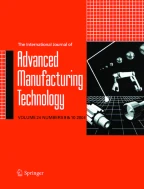Abstract
This paper presents a novel hybrid genetic algorithm (GA)-particle swarm optimization (PSO) approach for reliability redundancy allocation problem (RRAP) in series, series–parallel, and complex (bridge) systems. The proposed approach maximizes overall system reliability while minimizing system cost, system weight and volume, simultaneously, under nonlinear constraints. To meet these objectives, an adaptive hybrid GA–PSO approach is developed to identify the optimal solutions and improve computation efficiency for these NP-hard problems. An illustrative example is applied to show the capability and effectiveness of the proposed approach. According to the results, in all three cases, reliability values are improved. Moreover, computational time and variance are decreased compared to the similar studies. The proposed approach could be helpful for engineers and managers to better understand their system reliability and performance, and also to reach a better configuration.
Similar content being viewed by others
References
Kulturel-Konak S, Smith AE, Coit DW (2003) Efficiently solving the redundancy allocation problem using tabu search. IIE Trans 35(6):515–526
Kuo W, Wan R (2007) Recent advances in optimal reliability allocation. Comput Intell Reliab Eng Stud Comput Intell 39:1–36
Chern MS (1992) On the computational complexity of reliability redundancy allocation in a series system. Oper Res Lett 11(5):309–315
Hikita M, Nakagawa Y, Narihisa H (1992) Reliability optimization of systems by a surrogate constraints algorithm. IEEE Trans Reliab 41(3):473–480
Levitin G (2007) Computational intelligence in reliability engineering: evolutionary techniques in reliability analysis and optimization. Springer, New York
Nahas N, Nourelfath M (2005) Ant system for reliability optimization of a series system with multiple-choice and budget constraints. Reliab Eng Syst Saf 87:1–12
Shelokar PS, Jayaraman VK, Kulkarni BD (2002) Ant algorithm for single and multi objective reliability optimization problems. Qual Reliab Eng Int 18(6):497–514
Suman B (2003) Simulated annealing-based multi-objective algorithm and their application for system reliability. Eng Optim 35(4):391–416
Sung CS, Cho YK (2000) Reliability optimization of a series system with multiple-choice and budget constraints. Eur J Oper Res 48:158–171
Yun WY, Kim JW (2004) Multi-level redundancy optimization in series systems. Comput Ind Eng 46(2):337–346
Zafiropoulos EP, Dialynas EN (2004) Reliability and cost optimization of electronic devices considering the component failure rate uncertainty. Reliab Eng Syst Saf 84:271–284
Zhao R, Liu B (2004) Redundancy optimization problems with uncertainty of combining randomness and fuzziness. Eur J Oper Res 157:716–735
Altumi AA, Philipose AM, Taboun SM (2000) Reliability optimisation of FMS with spare tooling. Int J Adv Manuf Technol 16:551–558
Lee H, Kuo W, Ha C (2003) Comparison of max–min approach and NN method for reliability optimization of series–parallel system. J Syst Sci Syst Eng J Sci Syst Eng 12(1):39–48
Lillo Rosa E, Neuts Marcel F (2000) Empirical optimization in a reliability problem. Methodol Comput Appl Probab 2(4):413–424
Pan Z, Chen L, Zhang G (2007) A neural network method for reliability optimizations of complex systems. Wuhan Univ J Natl Sci 12(1):139–142
Li D, Sun X, Mckinnon K (2005) An exact solution method for reliability optimization in complex systems. Ann Oper Res 133:129–148
Norkina VI, Onishchenko BO (2008) Reliability optimization of a complex system by the stochastic branch and bound method. Cybern Syst Anal 44(3):418–428
Valdebenito MA, Schuëller GI (2010) A survey on approaches for reliability-based optimization. Struct Multidiscip Optim 42:645–663
Dengiz B, Altiparmak F, Smith AE (1997) Local search genetic algorithm for optimal design of reliable networks. IEEE Trans Evol Comput 1(3):179–188
Tavakkoli-Moghaddama R, Safari J, Sassani F (2008) Reliability optimization of series–parallel systems with a choice of redundancy strategies using a genetic algorithm. Reliab Eng Syst Saf 93:550–556
Ye Z, Li Z, Min X (2010) Some improvements on adaptive genetic algorithms for reliability-related applications. Reliab Eng Syst Saf 95:120–126
Hsieh YC, Chen TC, Bricker DL (1998) Genetic algorithms for reliability design problems. Microelectron Reliab 38:1599–1605
Kuo W, Prasad VR, Tillman FA, Hwang CL (2001) Optimal reliability design: fundamentals and applications. Cambridge University Press, Cambridge
Kim HG, Bae C (2006) Reliability-redundancy optimization using simulated annealing algorithms. J Qual Maint Eng 12(4):354–363
Yokota T, Gen M, Li YX (1996) Genetic algorithm for non-linear mixed-integer programming and its applications. Comput Ind Eng 30(4):905–917
Coelho LDS (2009) An efficient particle swarm approach for mixed-integer programming in reliability–redundancy optimization applications. Reliab Eng Syst Saf 94:830–837
Angeline PJ (1998) Evolutionary optimization versus particle swarm optimization: Philosophy and performance differences. In V. William Porto and et al., editors, Evolutionary Programming, vol. 1447 of Lecture Notes in Computer Science, pp. 601–610. Springer, 1998
Eberhart RC, Shi Y (1998) Comparison between genetic algorithms and particle swarm optimization. In et. al. V. William Porto, editor, Evolutionary Programming, vol. 1447 of Lecture Notes in Computer Science, pp. 611–616. Springer, 1998
Settles M, Soule T (2005) Breeding swarms: a GA/PSO hybrid. Proceedings of the 2005 conference on Genetic and evolutionary computation, pp. 161–168
Xu Z, Kuo W, Lin HH (1990) Optimization limits in improving system reliability. IEEE Trans Reliab 39(1):51–60
Holland J (1975) Adaptation in natural and artificial systems. University of Michigan Press
Levitin G (2005) The universal generating function in reliability analysis and optimization. Springer, London
Eberhart RC, Kennedy JF (1995) A new optimizer using particle swarm theory. Proceeding of the 6th international symposium on micro machine and human science, pp. 39–43
Kennedy JF, Eberhart RC (1995) Particle swarm optimization. Proc IEEE Int Conf Neural Netw 4:1942–1948
Author information
Authors and Affiliations
Corresponding author
Appendices
Appendix I




Appendix II




Appendix III




Rights and permissions
About this article
Cite this article
Sheikhalishahi, M., Ebrahimipour, V., Shiri, H. et al. A hybrid GA–PSO approach for reliability optimization in redundancy allocation problem. Int J Adv Manuf Technol 68, 317–338 (2013). https://doi.org/10.1007/s00170-013-4730-6
Received:
Accepted:
Published:
Issue Date:
DOI: https://doi.org/10.1007/s00170-013-4730-6



